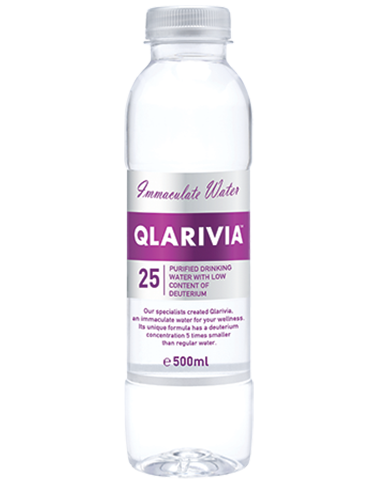
Deuterium Depleted Water - Ultra Purified Drinking Water - Light Water
Immaculate water for your well-being. Qlarivia has a low deuterium content and is the result of research in the field of isotope separation conducted over the years by a renowned team of specialists.
Deuterium is one of the hydrogen isotopes and is found in a proportion of approximately150 parts per million in most water. The lower deuterium content in glacial water especially from tens of thousands of years ago demonstrates that water has not always had such a high concentration of deuterium as today.
The low deuterium content of Qlarivia gives it therapeutic properties at cellular and DNA levels, slowing the aging process, lowering the appearance of cell division defects and improving the immune system.
RECOMMENDATIONS FOR USE: Drink around half a litre of Qlarivia a day. Even a single bottle of Qlarivia, preferably in the morning, helps to balance deuterium in the body.
It is common practice to mix Qlarivia with other good quality water and drink through the day.
If, for example you choose to mix it with Icelandic Glacial water with a deuterium content of approximately 148ppm, it will be possible to mix a water to a desired deuterium level.
1L of Icelandic Glacial and 500ml Qlarivia would give approx 115ppm water, or 4L Icelandic Glacial and 500ml Qlarivia would give approx 137ppm water.


Want to buy in bulk? Click Here
Details Click to see more
in the temperate climate area 150 ppm (parts per million) D/(D+H),
at the Equator 155 ppm,
in northern Canada 135 ppm.
The deuterium quantity in water varies not only with latitude but also altitude (with a values ranging between 150 ppm at sea level and 130 ppm at heights above 3000 meters).
The deuterium concentration in an adult organism is of about 12-14 mmol/l (millimoles per litre). Although it doesn't seems much, compared to the concentrations of other vital elements in the blood, deuterium is approximately six times more than calcium and ten times more than magnesium.
The deuterium quantity measured in the organisms that live in a certain geographic area is proportional with the deuterium concentration of the water in that area.
The abundance of deuterium in the water on Earth is approximately one deuterium atom to 6.400 hydrogen atoms (156,25 parts per million-ppm), or 0.0156%. This deuterium concentration changes very little from one natural water source to another.
The deuterium concentration in the adult human body is approximately of 120 to 140 ppm. Although it doesn't seem much, as mentioned above, if we compare this concentration with concentration in plasma of other vital elements, we can see that deuterium is present in an amount six times greater than calcium and ten times greater than magnesium.
Water with a deuterium molecule concentration of 1 to 120 parts per million can be considered deuterium depleted water (DDW). On average, deuterium is found in a concentration of 150 parts per million, in normal water. That is a rate of 1 deuterium atom for 6400 hydrogen atoms.
The deuterium content of waters in Europe is of 150 ppm (parts per million), with small fluctuations. The waters at the Equator have 155 ppm deuterium, while waters in northern Canada have 130-140 ppm deuterium.
The biological effects of deuterium depleted water were studied on plants, animals and humans and the results published in scientific papers.
These benefits can be grouped as follows:
The mechanisms that lead these biologic effects are little known and they probably have to do with the changes suffered at the interference of deuterium with the nuclear structures and the structures of cell enzymes, caused by the replacing of deuterium bonds with hydrogen bonds, which are more favourable to the efficient functioning of living cells.
Deuterium is one of 3 isotopes of hydrogen.The nucleus of most Hydrogen atoms in nature contains one proton, but the nucleus of some hydrogen atoms can contain one proton and one neutron or one proton and two neutrons.The first and the most common isotope of Hydrogen is call Protium (chemical symbol: 1H), the second is named Deuterium (chemical symbol: 2H or D), and the third one is Tritium (chemical symbol: 3H or T).
Protium and Deuterium are a stable isotopes, but Tritium is an unstable one.
Deuterium can have kinetic isotopic effects different than hydrogen has, and the physical and chemical properties of the deuterium compounds differ from those of hydrogen compounds. For example, D2O (heavy water) is more viscous and heavier than H2O (normal water).
Heavy water is approximately 10% more dense than normal water, enough for the ice formed of heavy water to sink in normal water.
The differences in connection energies and lengths of hydrogen isotope compounds are greater than the isotopic differences for any other element. The bonds between deuterium and tritium are stronger than those with hydrogen, these differences being enough to produce important changes in biological reactions.
Heavy water is toxic to eukaryotic organisms. If 25% of the water in the organisms is replaced by heavy water, problems in cell division and reproduction appear. If 50% of the water is replaced, the eukaryotic organisms die.
Higher concentrations of heavy water kills fish, amphibians and insects. Experiments conducted on rodents showed that a high level of deuterium of as much as 25% in the body water causes sterility, because neither the gametes nor the zygotes can develop.Small mammals such as rodents die after approximately a week of consuming heavy water. The cause of death is similar to that of cytotoxic poisoning (the case of chemotherapy) or acute radiation syndrome.

